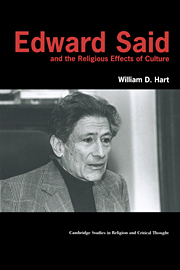Book contents
- Frontmatter
- Contents
- Preface
- Abbreviations
- Preliminary remarks
- 1 Culture as the transfiguration of religious thought
- 2 The religious effects of culture: nationalism
- 3 The religious effects of culture: Orientalism
- 4 The religious effects of culture: imperialism
- 5 The responsibilities of the secular critic
- 6 Marx, Said, and the Jewish question
- Concluding remarks: religion, secularism, and pragmatic naturalism
- Appendix A Whose exodus, which interpretation?
- Appendix B An exchange of letters between Michael Walzer and Edward Said
- Notes
- Select bibliography
- Index of names
6 - Marx, Said, and the Jewish question
Published online by Cambridge University Press: 22 September 2009
- Frontmatter
- Contents
- Preface
- Abbreviations
- Preliminary remarks
- 1 Culture as the transfiguration of religious thought
- 2 The religious effects of culture: nationalism
- 3 The religious effects of culture: Orientalism
- 4 The religious effects of culture: imperialism
- 5 The responsibilities of the secular critic
- 6 Marx, Said, and the Jewish question
- Concluding remarks: religion, secularism, and pragmatic naturalism
- Appendix A Whose exodus, which interpretation?
- Appendix B An exchange of letters between Michael Walzer and Edward Said
- Notes
- Select bibliography
- Index of names
Summary
THE JEWISH QUESTION
Somewhere, I surmise, offstage and in the background of the Said–Walzer dispute, is Marx's critique of religious identity and political liberalism in “The Jewish Question.” The great Zionist leader, Theodor Herzl, a younger contemporary of Marx, saw the establishment of a Jewish state as a solution to the Jewish question – a solution, that is, to the European tradition, several centuries long, of Jew-hating persecution. The same Jewish question on which many thinkers, including Marx, spilled much ink. Marx subordinates the Jewish question to the question of real emancipation, to which Jewish civil rights are, paradoxically, an obstacle and real Jewish emancipation is an effect. As I construe Said's view, Herzl's notion of Jewish emancipation won out, and in ways that Marx could have scarcely imagined. The resolution of the Jewish question, under the constraints of European imperial hegemony, created the “question of Palestine.” It is appropriate that this study of Said concludes with his reflections on the question of Palestine and with Marx's reflections on “The Jewish Question.” On these questions there is a convergence of the three interlocking themes of this study: the religious effects of culture, the religious seduction of the secular critic, and the return of repressed religiosity. This convergence underscores the importance of the questions that I posed in Preliminary Remarks and to which I have offered various responses throughout this study.
In “The Jewish Question,” Marx's argument takes a controversial form.
- Type
- Chapter
- Information
- Edward Said and the Religious Effects of Culture , pp. 143 - 162Publisher: Cambridge University PressPrint publication year: 2000

